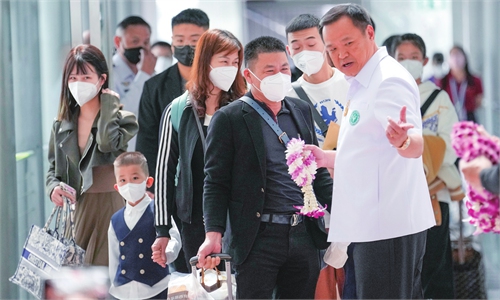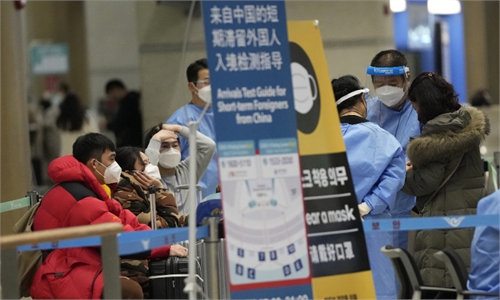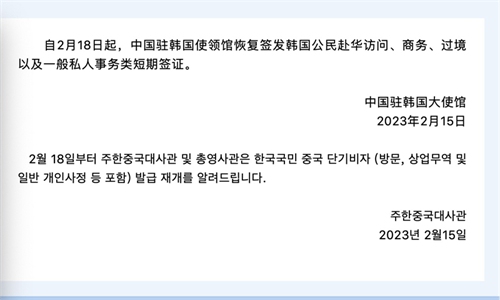
A visitor tries cosmetics at the South Korea pavilion during the 19th China-ASEAN Expo in Nanning, south China's Guangxi Zhuang Autonomous Region, Sept. 18, 2022.Photo:Xinhua
Korean airlines hope to increase the number of flights to China as South Korea decided to lift a post-arrival test requirement for travelers from China from March 1 as the COVID-19 situation has stabilized.
"We have submitted the applications to increase the flights to the regulators of the two countries in March, and the plan is under approval", Korean Air told the Global Times on Tuesday.
To meet the full resumption of Korea-China routes, Korean Air has completed the preparations related to the airport service and sales network in China, and is capable of quickly providing high-quality services to passengers when the number of flights increases, the company said.
"We hope our flights can return to pre-epidemic levels soon," it said.
Currently, there are nine two way routes between China and the South Korea at the end of February for Korean Air, covering cities such as Shenyang, Tianjin, Shanghai, Guangzhou and Nanjing.
In comparison, Korean Air's routes in 2019 covered 22 cities in Chinese mainland with more than 230 scheduled flights every week, and it is the overseas airline with the most cities covered in China.
In terms of cargo, Korean Air operates four scheduled routes with 25 flights per week.
Since the opening of the Seoul-Beijing route, the first scheduled passenger flight between China and South Korea in December 1994, Korean Air has continuously expanded its route network over the past 30 years, making great contributions to promoting bilateral exchanges and economic development.
The Chinese market is a very important market accounting for a high proportion for our passenger and cargo business, the company said.
Travelers from China have been required to take polymerase chain reaction (PCR) tests after arrival since early January. But from March 1, the post-arrival test requirement will be lifted, and flights from China will be allowed to land at other airports besides the Incheon International Airport, west of Seoul.
The pre-arrival test requirement, in which travelers from China are required to show negative COVID-19 test results before boarding flights to South Korea, will be put in place until March 10 to monitor the effect of the moderated quarantine measures, according to the Xinhua News Agency.
All 190 travelers with short-term visas from China tested negative for COVID on Monday, the fifth time reporting zero positive cases since January 2, Yonhap News Agency reported on Tuesday.
Asiana Airlines, another major carrier in South Korea also show the same willingness to increase flights to China.
"We are applying for more flights to China, and waiting for the approval from the regulators", an insider with the carrier told the Global Times.
There are 10 flights between nine cities in Chinese mainland and Seoul as of the end of February, a big decline compared with pre-epidemic levels.
Data from industry information provider VariFlight showed that a present, the number of flights from the Chinese mainland to South Korea has only recovered to about 10 percent of the pre-epidemic level, even there have 21 cities including Beijing, Tianjin, and Dalian flying directly to South Korea.
Among them, direct flights from Qingdao to Busan, and from Xi'an to Jeju Island resumed after a three-year suspension from March 2.
Starting from February 18, Chinese embassy and consulates in South Korea will resume issuing short-term visas for South Korean citizens to visit China, for business, transit and other private affairs, according to the Chinese Embassy in South Korea.
It is regarded as a positive sign for travel and communications between the Chinese and South Korean people as a response after South Korea resumed short-term visa issuance for travelers from China.




